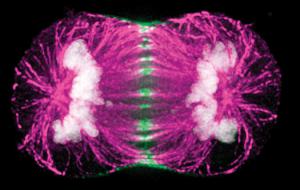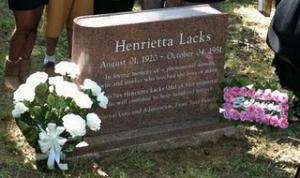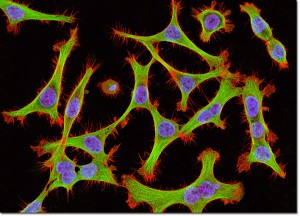Serendip is an independent site partnering with faculty at multiple colleges and universities around the world. Happy exploring!
Towards Day 21: What Henrietta Lacks

class notes: tgarber's and SandraG's
![]()
from The K Chronicles and Th(ink) Website
I. coursekeeping
today's notetakers: tgarber and SandraG
for Thursday, read the last 50 pp. of Rebecca Skloot's The Immortal Life of Henrietta Lacks, plus 50 other, earlier pp.
II. Reflecting back on Path to Paradise,
and what paths might open up for us from that site...
revelation for me was the limitations of the personal interview (and the limitations of much "individualistic" literary criticism) as a site for understanding : focusing on the psychological doesn't invite interpretation of the larger systemic forces @ work
Berko's positioning herself as a woman talking to women, a mother talking to mothers, an individual talking to individuals elides the power differential between them (Israel has much more power to build peace;
the U.S. as a major financier, has even huger power)
(from my daughter): there is much useful, and inspiring narrative-revising being done by young people on both sides of the divide
Budrus: a new film telling the story of a village that successfully prevented the separation wall from being built through it by peacefully mobilizing the residents of the town
Young, Jewish and Proud: the speech Netanyahu gave in New Orleans last week was disrupted by a group of Israeli and Jewish American activists shouting that "the occupation delegitimizes Israel," "the settlements betray Jewish values," etc.
quietness of class on Thursday: discouraged about possibilities? literary, non-fictional, political?
III. This tension between the individual and the political, the idiosyncratic and the general (where should our focus lie? can we keep looping back and forth between these two poles??) was a key theme @
RE: Humanities: A Symposium on Digital Media in Academia
Kathleen Fitzpatrick, "The Future of Authorship: Scholarly Writing in the Digital Age" (was I think about 'distant,' 'machine,' 'hyper' reading--
Normal.dotm
0
0
1
18
108
Bryn Mawr College
1
1
132
12.0
0
false
18 pt
18 pt
0
0
false
false
false
challenging the old "linear approach that enshrines books" by re-thinking them as "random access technology, open-able anywhere, not needing to be 'read through '"; as the source of very large data sets)
vs.
Amanda French, "Humanities Research Methods from 1860 to 2060": "data dismay"--> what to do w/ all the stuff we're getting online? aim not for
Normal.dotm
0
0
1
2
13
Bryn Mawr College
1
1
15
12.0
0
false
18 pt
18 pt
0
0
false
false
false
comprehensiveness, but use rather as a source of compelling examples; engage in ‘datum love’: random, serendipitous, affectionate, impressionistic selections, a "new age of humanities induction," observing in "specific humanistic way";
Normal.dotm
0
0
1
5
33
Bryn Mawr College
1
1
40
12.0
0
false
18 pt
18 pt
0
0
false
false
false
"humanists can re-humanize massive sets,"
Normal.dotm
0
0
1
10
59
Bryn Mawr College
1
1
72
12.0
0
false
18 pt
18 pt
0
0
false
false
false
refusing the compelling idea of analyzing the whole using technological tools, and seek more impressionistic,
Normal.dotm
0
0
1
8
47
Bryn Mawr College
1
1
57
12.0
0
false
18 pt
18 pt
0
0
false
false
false
anti-argumentative, anti-interpretative, anti-analytical forms of scholarship: "there are smaller, more inductive, more affectionate, more 'recognizably human' things we could do" (my challenge re: valorization of a specific sort of anti-scientific "humanness"; it is human to seek patterns!)
IV. Thinking here, too, about your own papers--
ckosarek: I've never been in an English class that encourages ... the use of multimedia sources in papers ... I find our webpapers more aesthetically pleasing ....Having images and outside links in our papers allows our minds to wander - but not too far ... the execution of our papers have turned out to reflect the creativity of our ideas themselves ... that creative ideas are matched with creative presentation ... seems to make them more important - to elevate them more ... we also run the risk of adding unrelated distractions into our papers ...
[or, as per Katherine Hayles: offering the possibility of a different kind of reading....? more what we call "skimming." She terms this practice "hyper reading": "reader-directed, screen-based, computer-assisted reading [including] search queries...filtering by keywords, hyperlinking, "pecking" (pulling out a few items from a longer text), and fragmenting ... juxtaposing, as when several open windows allows one to read across several texts, and scanning, as when one reads rapidly through a blog."]
V. use the concept of tension between different levels of analysis [massive data sets, more nuanced attention to details; the general and the individual] to begin "unpacking" Henrietta Lacks' Immortal Life, "a book that was a biography of both the cells and the woman they came from" (6).
 |
 |
Go 'round w/ initial impressions: how did the book "operate" on you, on what "structural" level? cellular, biographical, political? (give one telling detail...)
Smacholdt: I keep forgetting that I am reading nonfiction because the book reads so much like a novel. I enjoy the combination of science, narrative, and history ... It makes the biological information accessible ... shows the humanity behind the science ... instead of separating the human aspects and the scientific aspects of the story
tgarber: I too agree that it reads like a fictional novel. Because of that, it raises many questions for me about how Skloot knows so many details ... Did she ADD things to make the novel more interesting. I feel that she does.
pfischer on the question of genre: I wondered if the book was a biography, a work of science journalism, or a historical work investigating structural and overt racism within the medical community. The relationship between Henrietta Lacks, the woman, and the HeLa cells, which were once part of Henrietta Lacks, serves as the emotional and scientific center of the book .... The portrayal of Henrietta's identity allows Skloot to emphasize Henrietta's humanity, and therefore firmly ground her family's anger in a matrix of humanity, religion, and corporeality. The other aspect of Skloot's presentation of Henrietta's identity as a sort of pawn in a broader biopolitical scheme and invites a political examination of racist exploitation of black bodies within the American medical system. Henrietta's body as a tool and commodity of the U.S. medical system was my reading of the text, I am interested to know if others found it more of a personal biography of the woman Henrietta Lacks or more of an investigative journalism report.
veritatemdilexi's Concerns Addressed: I am very interested in ... what we will focus on. Will it be medical ethics, religion, the disparity in medical coverage for rich and poor in this country, or the role that race plays in all of the above topics?
Owl: Seeing as I was not sure what genre or sub-genre The Immortal Life of Henrietta fell under, I found that it is considered to be investigative journalism ... a "form of journalism which deeply investigates a single topic of interest, often involving crime, political corruption, or corporate wrongdoing." Reading The Immortal Life ..., you feel inclined to blame the scientist for their "wrongdoing" with Henriett's cells. However, in an interview ... Skloot specifically states that the book was not meant to make scientists look like the bad guys .... That being said ... I think ... the genre itself automatically sets up the reader to see truth in the consequences ....
Others...?
Skloot, ix: "This is a work of nonfiction. No names have been changed, no characters invented, no events fabricated....As one of Henrietta' relatives said to me, 'If you pretty up how people spoke and change the things they said, that's dishonest. It's taking away their lives, their experiences, and their selves.'"
"We must not see any person as an abstraction. Instead, we must see in every person a universe with its own secrets..." (Elie Wiesel, from The Nazi Doctors and the Nuremberg Code)
"Everybody has a secret world inside of them...." (Neil Gaiman)
and yet, biologists teach us that the assemblies of cells that make up living organisms, and ... the assemblies of living organisms that make up the panoply of continually evolving life ... have mechanisms that assure that local components take into consideration the interests of both other local components and the well-being of the larger assembly. When these fail, one gets cancer, warfare, and widespread extinction.
Let's try reading this non-fictional prose work (about cancer!) as systems biologists, focusing on its complex interactions, emergent properties.... using the (more "collectivist"?) methodology of biology to read a literary text.
Is the language of the 3 parts of the book--"Life, Death, Immortality"--individualistic or collectivist? humanistic or scientistic? where is HeLa located? where is Henrietta's "self"?
I. Life
1: "the world's first immortal cells" (5: "go on dividing indefinitely")
3: "all it takes is one small mistake anywhere in the division process"
4: "any cell culture lab in the world ... we'd find ... billions of Henrietta's cells... but no one knows anything about her"
7: I'd become a character in her story, and she in mine...the Lackses challenged everything I thought I knew...
Deborah's voice: "she helpin lots of people...now we don't get a dime."
16: walking into Hopkins was like entering a foreign country
29: used patients from public wards for research without their knowledge
30: Gey "the world's most famous vulture, feeding on human specimens"
40-1: growing with mythological intensity... "spreading like crabgrass!"
48: "it just feels like that blackness be spreadin all inside me"
55: "You got my wife cells? She know you talking?...so let my old lady cells talk to you and leave me alone"
58: referring to the cells as his "precious babies"
62: Tissue culture was the stuff of racism, creepy science fiction, Nazis, and snake oil.
63: "benevolent deception"
80-1: "Everything about Henrietta dead except them cells...Nobody round here never understood how she dead and that thing still livin."
II. Death
90: her other organs were so covered in small white tumors it looked as if someone had filled her with pearls.
91: "Oh jeez, she's a real person."
97: that HeLa was malignant just made it more useful.
118: "her cells done lived longer than her memory"
122: slave-owning white Lackses ... buried under their black kin ... "spending eternity in the same place....They must've worked out their problems by now!"
129: inmates "considered a vulnerable population unable to give informed consent"
130: "To withhold emotionally disturbing but medically nonpertinent details..is in the best tradition of responsible clinical practice"
131: the Nuremberg Code says, "The voluntary consent of the human subject is absolutely essential." The idea was revolutionary.
132:should informed consent apply in cases...where scientists conduct research on tissues no longer attached to a person's body
134: "If the whole profession is doing it, how can you call it 'unprofessional conduct'?"
154: "drop a turd in the punch bowl"--the HeLa contamination problem
159: "she was really just hospitality"
161: "her cells growin big as the world, cover round the whole earth...just steady growin and growin, steady fightin off whatever they fightin off"
165: black oral history filled with tales of "night doctors" who kidnapped black people for research...disturbing truths behind those stories.
168: "If our mother so important to science, why can't we get health insurance?"
169: "You know what is a myth?...She didn't donate nothing. They took them and didn't ask."
173: War on Cancer (vs. "War is a Bad Metaphor")

class notes: tgarber's and SandraG's


